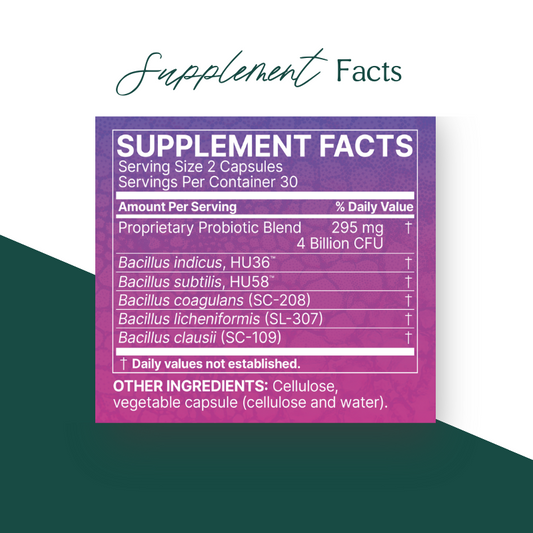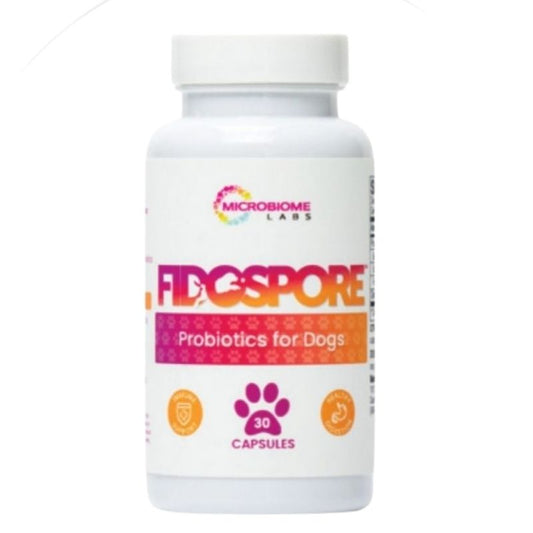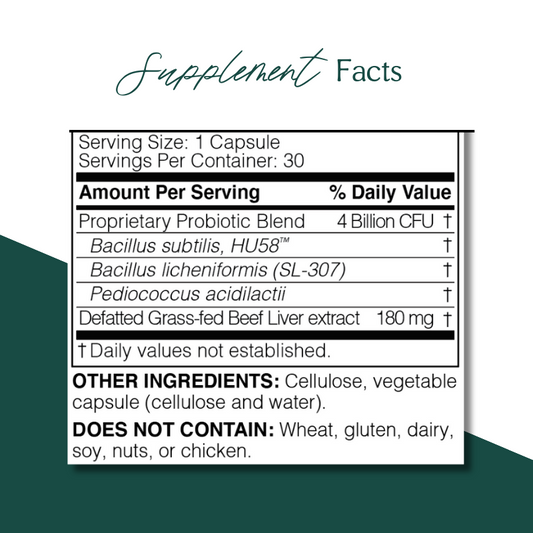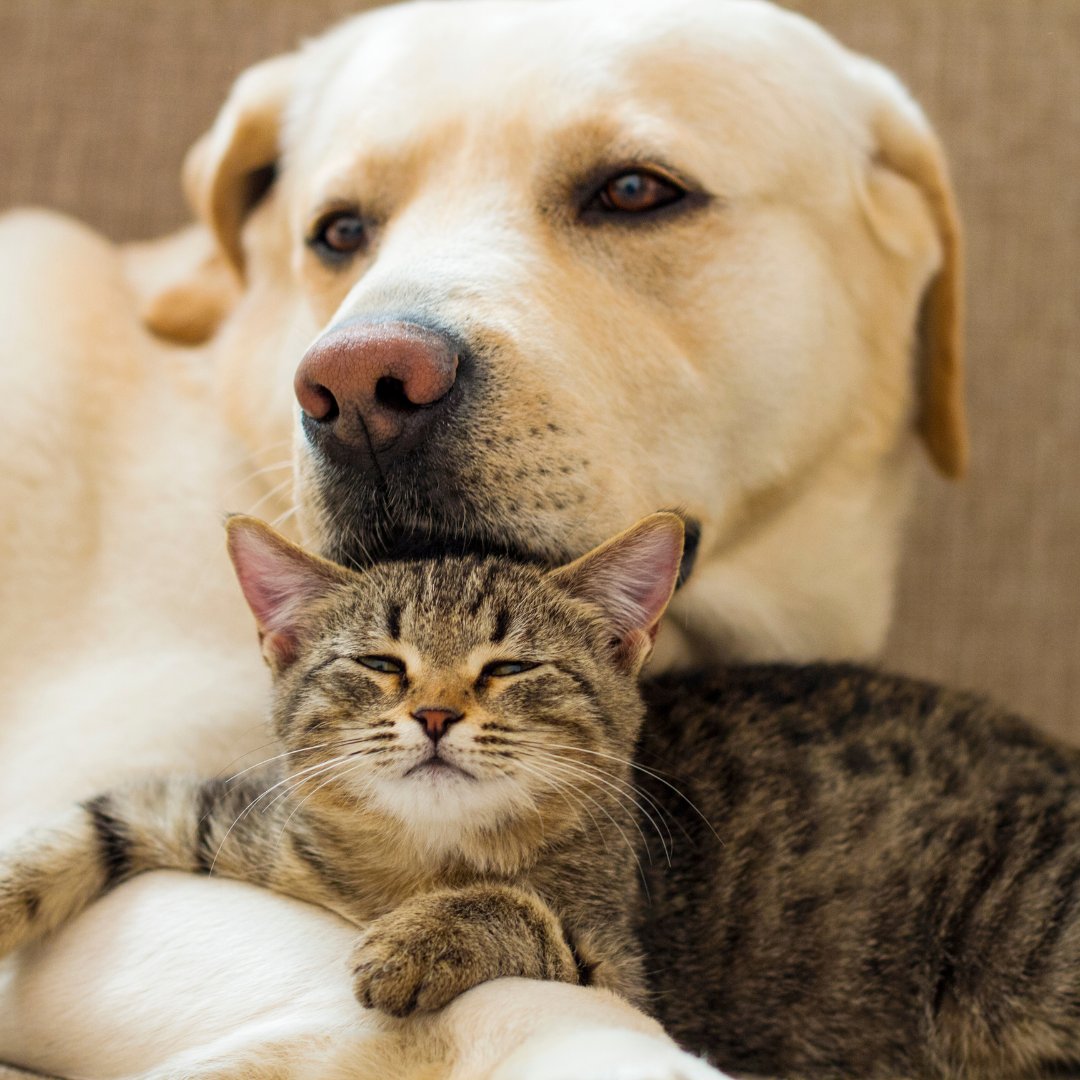
Digestive (GI) Support for Pet
Maintaining good gut health, also known as gastrointestinal (GI) or digestive health, is crucial. The gut produces 75% of the Immune system function and 90% of Neurotransmitters in the body. It's the basis of all health.
If your pet has always had a sensitive tummy or experienced occasional digestive discomfort, Dr. Ruth Roberts has crafted this specialized support protocol. It's designed to provide the nurturing and fortification needed to promote a healthy and resilient digestive system for your furry friend.

Dr. Ruth Roberts
Tummy Rescue - Digestive Relief Supplements for Pets
Share











-
Tummy Rescue - Digestive Relief Supplements for Pets
(42)Regular price $161.62 USDRegular priceUnit price perIntroducing Tummy Rescue, the ultimate bundle of supplements designed to provide digestive relief for your pets! This powerful combination includes Omega-Pawz by Dr. Ruth Roberts, Canine Enteric Support, and Fidospore, three top-quality supplements that work together to support your pet's digestive health. With Tummy Rescue, you can help your pet find relief from periodic GI issues such as gas, bloating, and diarrhea. Omega-Pawz contains fish oil with omega-3, molecularly distilled and filt...
-
MegaSporeBiotic™ - The Best Gut Health Supplements for Pets
(42)Regular price $72.00 USDRegular priceUnit price perMegaSporeBiotic™ is the best solution for pet owners looking to improve their pet’s gut health. This powerful spore-based probiotic supplement is specially formulated to target bloating, diarrhea, and other digestive issues. Featuring a unique blend of 5 Bacillus spores, MegaSporeBiotic™ helps to restore the balance of beneficial bacteria in the gut, supporting healthy digestion and immune function. In addition to its digestive benefits, MegaSporeBiotic™ can also help reduce inflammation and ...
-
Mega Mucosa - Gut Health Supplements for Dogs and Cats
(42)Regular price $63.99 USDRegular priceUnit price perMegaMucosa is an innovative gut health supplement designed to support a healthy mucosal barrier. This unique formula contains dairy-free immunoglobulins that have been clinically shown to boost the immune system in the mucosa, as well as amino acids and citrus polyphenols that support microbial diversity and short-chain fatty acid production. MegaMucosa is not just for humans - it can also be used to support the gut health of your furry friends. Benefits: Supports a healthy mucosal barrier...
-
Fidospore by MicroBiome Labs - Digestive Probiotic for Pets
(42)Regular price $43.99 USDRegular priceUnit price perFidospore by Microlabs is a premium digestive probiotic designed to address a common issue among pets: digestive problem. This powerful formula is packed with beneficial probiotics that work to restore the balance of healthy gut bacteria in your pet’s digestive system. Fidospore is easy to administer and safe for all breeds of dogs and cats. Simply sprinkle the recommended amount onto your pet’s food, and let the probiotics work their magic. With regular use, Fidospore can help to improve you...
-
Heartburn Tx* 218 gms 7.6 oz | Dr. Ruth Roberts
(42)Regular price $42.10 USDRegular priceUnit price perHeartburn Tx Powder contains nutrients to reduce inflammation in the intestines, and the raw materials to help healthy new enterocytes (cells of the intestine) grow and restore normal gut function. Serving Size:1 Teaspoon Servings Per Container:50 Amount Per Serving Zinc (as zinc carnosine) 2.25 mg 15% Proprietary Blend 4.35 g L-Glutamine Glycine N-Acetyl Glucosamine Deglycyrrhized Licorice Root Aloe Vera Leaf Inner Fil...
-
RestorFlora - Natural Probiotics for Dogs and Cats
(42)Regular price $43.99 USDRegular priceUnit price perRestorFlora™ is an advanced probiotic supplement that features a combination of well-studied and widely-used probiotic strains, including Saccharomyces boulardii, Bacillus subtilis HU58, and Bacillus clausii SC109. This powerful blend of probiotic yeast and bacteria offers comprehensive digestive flora support, helping to maintain a healthy intestinal environment. In addition to supporting human digestive and immune health, RestorFlora™ can also be used for pets, including cats and dogs, to p...
-
The Complete CrockPET Diet Kit - Holistic Natural Dog Food
(42)Regular price $206.84 USDRegular priceUnit price perPrioritize your pet's well-being with The Complete CrockPET Diet Kit - Holistic Natural Dog Food. This resource is ideal for pet owners who desire a long, healthy life for their furry companions—offering an ultimate CrockPET Diet® that is formulated by dr Ruth Roberts and packed with all the nutrients your dog. By utilizing The Original CrockPET Diet® and the kit's supplements, you can provide your pet with delectable and nutritionally adequate meals. When you purchase this starter kit, you'l...
-
DoggyBiome™ Gut Health Test
(42)Regular price $125.00 USDRegular priceUnit price perIf your dog’s gut microbiome is out of balance or missing beneficial bacteria, important digestive and immune functions may not work properly, causing symptoms like diarrhea, vomiting, constipation, and skin issues. The Gut Health Test report gives you the tools to understand your dog’s everyday digestive health. Using DNA sequencing, we analyze the bacteria in the sample and compare it to our healthy dog reference set to determine if an imbalance is present. The test kit includes everythin...
Let's Learn more about
Gut Health in Cats and Dogs
Gut health, also referred to as gastrointestinal (GI) or digestive health, is a fundamental element that underpins the overall well-being of our cherished pets. It encompasses the intricate system responsible for processing and absorbing nutrients from the food they consume. This system, comprising the stomach, intestines, and associated organs, plays
a pivotal role in their daily functioning.
Let's delve into the very essence of what makes their digestive systems tick, examining the multifaceted factors that contribute to its vitality and equilibrium. By understanding the intricacies of this complex system, we empower ourselves to be vigilant caretakers for our furry companion.
Common Causes of Digestive Disruptions
🐶 Dietary Choices
The type and quality of food our pets consume play a fundamental role in their digestive health. Abrupt dietary changes or low-quality ingredients can lead to digestive upsets.
🐶 Food Allergies and Sensitivities
Some pets may have specific sensitivities or allergies to certain ingredients, causing digestive discomfort.
🐶 Stress and Anxiety
Emotional well-being directly impacts gut health. Stressors like changes in environment, separation anxiety, or traumatic events can manifest in digestive issues.
🐶 Infections and Parasites
Bacterial or viral infections, as well as the presence of parasites in the digestive tract, can lead to GI disturbances.
🐶 Underlying Medical Conditions
Chronic diseases such as inflammatory bowel disease (IBD), pancreatitis, or gastrointestinal cancers can significantly affect gut health.
Common Symptoms of Digestive Distress
🐱 Vomiting and Diarrhea
Frequent or chronic episodes of vomiting and diarrhea are primary indicators of GI upset.
🐱 Changes in Appetite
A sudden loss of interest in food or a significant increase in appetite can be signs of underlying digestive issues.
🐱 Abdominal Discomfort
Restlessness, pacing, or signs of discomfort like hunching over can signal digestive discomfort.
🐱 Flatulence and Bloating
Excessive gas or a distended abdomen may indicate digestive imbalances.
🐱 Irregular Bowel Movements
Straining during bowel movements, constipation, or the presence of blood in stool can be cause for concern
Relief and Supportive Measures
✅ Dietary Adjustments
Transitioning to a high-quality, easily digestible diet tailored to your pet's specific needs can provide significant relief.
✅ Probiotics and Digestive Enzymes
These supplements help restore and maintain a healthy balance of gut bacteria, aiding in digestion.
✅ Hydration
Proper hydration is crucial for digestive health. Ensure your pet has access to fresh, clean water at all times.
✅ Stress Management
Implement techniques to reduce stress, such as regular exercise, mental stimulation, and a stable routine.
✅ Consult with a Veterinarian
Seek professional advice to rule out underlying medical conditions and receive a tailored treatment plan.
✅ Holistic Approaches
Alternative therapies like acupuncture or herbal remedies can complement conventional treatments for digestive issues.





















